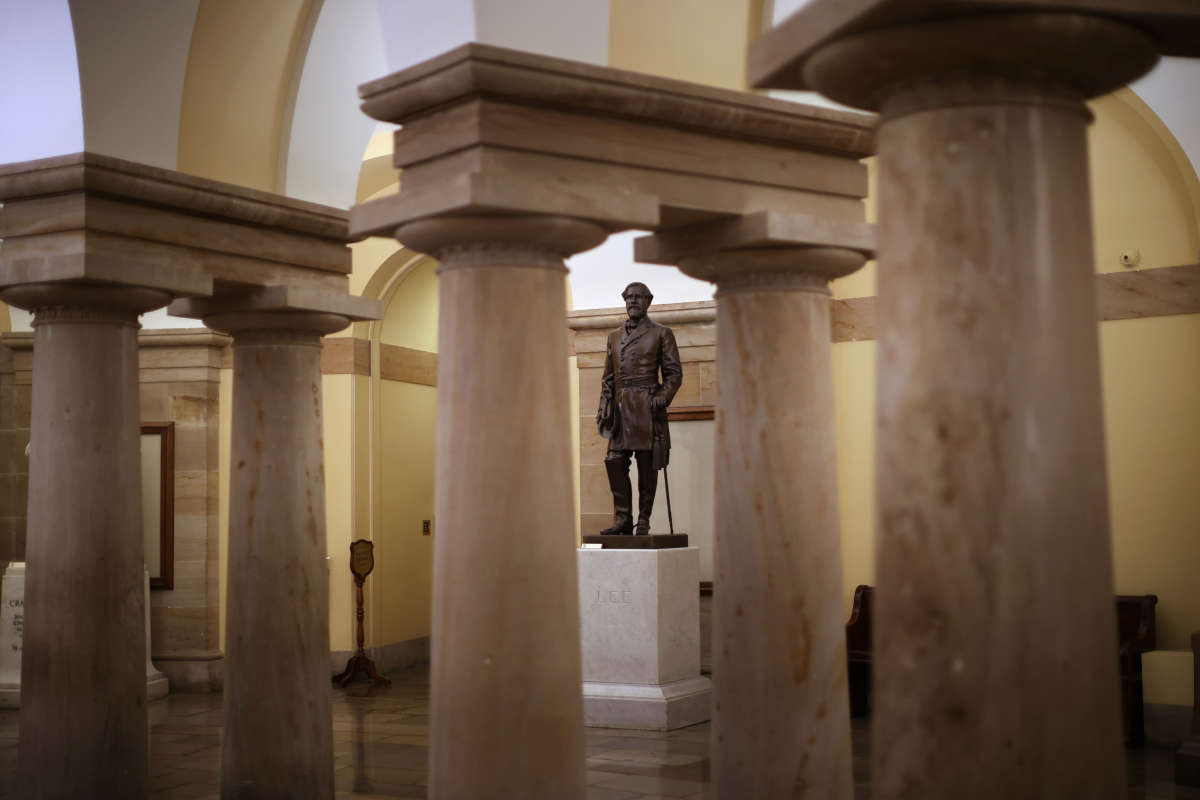The House voted on Tuesday to remove all statues of Confederate leaders on display in the Capitol as well as a bust of a former Supreme Court chief justice who in 1957 wrote the Dred Scott decision, regarded as one of the most loathsome racist court decisions in U.S. history.
The measure passed 285 to 120, with all Democrats and 67 Republicans supporting the resolution. All 120 no votes were from Republicans. The bill now goes to the Senate, where it will likely face opposition from Republicans there.
The House has passed similar legislation before, in 2020, when the bill passed by a slightly larger margin — 305 to 113. But Republicans blocked it from being considered in the Senate and Sen. Mitch McConnell (R-Kentucky), the majority leader at the time, refused to bring it to a vote.
“Symbols of racism and hatred have no place in our country and should certainly not be enshrined in the U.S. Capitol,” said Rep. Barbara Lee (D-California), one of the legislators who reintroduced the resolution, in a statement in May. “The Dred Scott decision is a moral stain on our nation. Removing these statues is a long overdue step in addressing America’s painful legacy of racism.”
The passage of the bill comes as the nation is facing a reckoning over racism and the U.S.’s racist history. Activists have been advocating for tearing down Confederate monuments and other symbols of oppression for years, but the movement picked up steam last year during the resurgence of the movement for Black lives.
A report from earlier this year found that 168 Confederate symbols were removed in 2020, either forcefully by demonstrators or voluntarily by local government officials.
Rep. Steny Hoyer (D-Maryland) had originally proposed removing the Confederate statues in the Capitol last summer as demonstrators across the country were participating in protests after the police murder of George Floyd.
It’s unclear whether Hoyer’s resolution will pass this time. If McConnell unites his party in opposition to the bill, Democrats will have trouble finding 10 Republican votes to help them pass the filibuster. But it’s unclear if McConnell will oppose the effort, and it’s unclear if his party would unite against it.
Earlier this month, the Senate passed legislation making Juneteenth a national holiday, with only 14 House Republicans voting against it.
It was a somewhat surprising move for Republicans to recognize a holiday that celebrates emancipation, considering that they are currently waging a war on the history of Juneteenth itself in schools across the country. Many abolitionists and advocates for Black lives, however, argued that making Juneteenth a holiday is largely symbolic and possibly harmful in the face of the realities of police violence and oppression that Black Americans face daily.
Rep. Jim Clyburn (D-South Carolina), one of the lawmakers who reintroduced this session’s resolution to remove the Confederate statues, pointed to the violence and racism inherent in the Donald Trump-fueled attack on the Capitol on January 6 as a reason for Congress to vote to remove the statues.
“On January 6th, we experienced the divisiveness of Confederate battle flags being flown inside the U.S. Capitol. Yet there are still vestiges that remain in this sacred building that glorify people and a movement that embraced that flag and sought to divide and destroy our great country,” Clyburn said in a statement. “This legislation will remove these commemorations from places of honor and demonstrate that as Americans we do not celebrate those who seek to divide us.”
Join us in defending the truth before it’s too late
The future of independent journalism is uncertain, and the consequences of losing it are too grave to ignore. To ensure Truthout remains safe, strong, and free, we need to raise $31,000 in the next 48 hours. Every dollar raised goes directly toward the costs of producing news you can trust.
Please give what you can — because by supporting us with a tax-deductible donation, you’re not just preserving a source of news, you’re helping to safeguard what’s left of our democracy.
